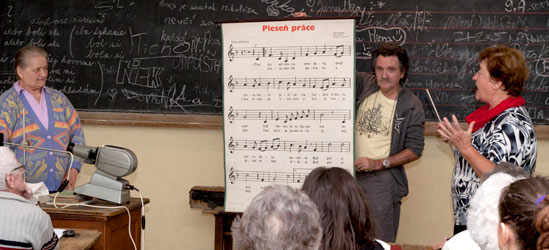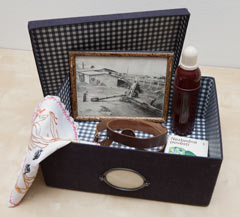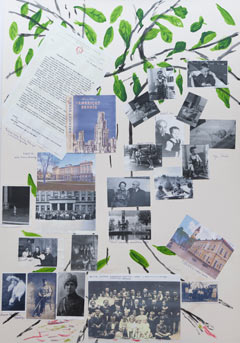Review of RTRT project: Slovakia

Memorable moments that took place in our RTRT group
-
“I forgot about when and how I got married. I'm here to remind everyone I don´t know, that it really happened and to remember a lot of what I experienced in my life”
Mrs Stefania talked about her sister, who died unexpectedly in childhood. Stefania did not discuss that topic very often in her family. Our group was able to create a safe and understanding environment, so she could talk about it and her son learnt how that had happened. Her sister´s death had been painful for Stefania during her whole life, and her emotions were released during the reminiscence group and she experienced the situation back again after many years
-
Mrs Lydia is 90 years old, and often experiencing disorientation. She gave birth to her son in her late age and she confuses her son with her father who was a soldier. She was hurt by his strict and intolerant behaviour. During reminiscence a moment occurred, when Lydia thanked her son for taking care of her and supporting her, despite the fact she does not recognize him very often
-
“It is very touching that we can remember our childhood and families”
The people with dementia were able to verbalize the significance of these meetings; independently and proactively they involved themselves in planning and suggesting new topics for future meetings. One can say that together with their relatives and the community (which they are part of due to their handicap) they are actively taking part in activities that bring benefit to their lives. This proves that under certain conditions (created by us) even people with dementia are able to become full members of the community
-
“I was close to tears during the meeting”
Mr Ladislav, taking care of his wife Maria, gave a very lively description of how they got to know each other. He expressed some of the situations in detail and told the story in a very funny way. His wife did not remember too much about it, but as soon as he started to talk, she listened to him carefully, nodded and laughed together with him. Creating suitable conditions for such situations is important for both spouses. For Ladislav who remembers only loving moments, as well as for Maria who listens to the stories about her life and actively – now and here – she is able to reactivate her life pictures and memories
-
“Wedding day” – the occasion when we staged this was a memorable for all participants. The people put themselves in the situation, remembered their own wedding days and sincerely enjoyed it with the protagonists. The situation was even more authentic when a couple, planning to celebrate 60 years wedding anniversary in few days, played “getting married” in front of the audience
The main things we have learned

Successes to build on:
-
Creating a group that meets regularly is a good basis for cooperation and successful reminiscence. The sense of being a group gives a “right” atmosphere to the process. The stories of the people could add to each other, stimulate their memories and help in recalling and sharing experiences. An interesting aspect was the involvement and co-operation of the relatives during the meetings. We believe that this also fulfilled the educational and supportive function for family members and family guardians
-
Planning of the topics in chronological order around the milestones in life provided a good focus when selecting the topics, eg. from childhood through young age, manhood, up to the founding of one’s own family. The order helps the attendee to get oriented in the topics and avoids disorientation and confusion over the life stages
-
Regularity of activities – having a consistent pattern of activities was helpful, for example, initial social contact, stimulation, sharing of memories, development of memories and so on
Pitfalls to avoid:
-
Meeting Leader – A memory could suddenly recur for a person with dementia, who may start crying. The leader must be ready for such situations, able to handle emotional tensions and to keep the meeting moving forward for the rest of the group
-
The identification and selection of positive topics – it is possible that a person in the group reacts negatively when remembering difficult times from the past
-
Suggesting topics and creative activities so each participant benefits from these or so each participant has a chance to take a part. The activities should stimulate the communication and speech, but also non-verbal responses which use other communication techniques – movement, dance, music, painting, sounds, smells, touch. The material should be stimulating enough, involving some physical movement, and should involve selecting and performing activities expressing their own real life experiences. If we do not adjust the activity to reflect the interests and issues of participants, it could happen that the meeting will not be interesting for them, and will not motivate them to meet in the future
The main things that the carers in our groups learned about reminiscence

Learned and gained:
-
How to communicate with the relatives, what techniques to use effectively in communication (eg. how to ask questions, how to formulate the question)
-
They learned that their relatives are still able to express themselves even concerning topics, memories and experiences which were hidden due to dementia
-
It is important to spend time with their relatives with dementia
The fact that dementia is not only negative, but has also many positives
They get known other relatives with same problems – “I have the feeling that I am not alone in the difficult situation, not the only one.”
What the people with dementia in our groups gained from the project:
-
 They experienced positive feelings, happiness and support
They experienced positive feelings, happiness and support -
They were in an understanding, non-judgemental environment, where they felt safe and were full members of the community
-
They were listened to, had a chance to say and express their attitudes, opinions, thoughts, they could take decisions independently on what they liked/didn’t like to do
-
They created something that had a real basis in their lives – they passed their memories, advice and experiences on to the “next” generation
Future plans
Plans for future reminiscence work in dementia care:
-
We plan to implement these techniques into our everyday care of senior people - using these activities in the daily care of clients
-
We wish to provide these programmes for family members, carers and volunteers, as these were proven to be highly effective
-
We shall provide know-how for employees in residential care (ergotherapists, teachers, psychologists, therapists, nurses) and also for students
Plans to develop reminiscence projects in other contexts:
-
The experience gained in the reminiscence meetings was implemented in an educational programme for professionals “Clients with Alzheimer disease in social care
-
The experience from reminiscence meetings was presented during a professional workshop for therapists and medical educators held on 21st January 2012 in Bratislava
-
The documentary film was created during reminiscence meetings and was shown on state TV 4th May 2012 at 2.30 PM
-
We shall be presenting the project “Remembering Together” and our positive experiences at an educational programme called “Family Education” for family carers to be held at the Memory Centre
-
The project was presented at the international conference on “Activation of seniors and non pharmacological approaches in the treatment of Alzheimer disease” on 20th September 2011 in Bratislava
-
The results of the project will be presented at the next international conference “Activation of seniors and non pharmacological approaches in the treatment of Alzheimer disease” on 19th September 2012 in Bratislava
-
We shall publish an educational brochure for carers and families on how to use reminiscence in residential and home care of people with dementia






